Women Who Create Music
Ethel Smyth
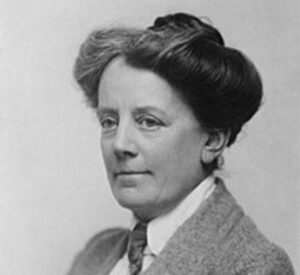
Ethel Smyth (1858 – 1944) of England was born to well-to-do parents who expected her to get some kind of low-key education and then settle down and raise a family. Ethel would have none of it, telling her parents from a young age that she wanted a career and was going to be a composer. She insisted on her works being performed and published. She frequently traveled between England, Germany and Italy, where she came to know Brahms, Clara Schumann, Tchaikovsky, Grieg, Bruno Walter and other notable composers and performers of the day. She informally performed for Queen Victoria and she was friends with the ex-Empress Eugenie of France and the Princesse de Polignac, Winnaretta Singer. In the last decades of her life she formed strong friendships with Edith Somerville and Virginia Woolf.
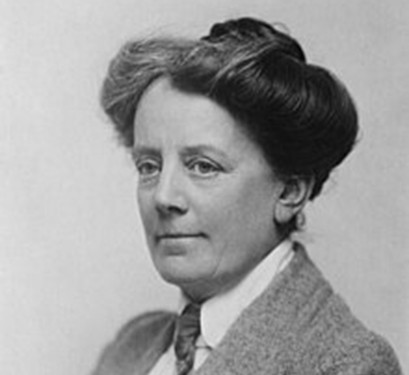
Between 1880 and 1930, she published two sets of lieder, several songs for voice and piano or chamber ensemble, numerous chamber pieces, two symphonic works, six operas, a mass, and a choral symphony. Today we also know of her unpublished works for solo piano, organ, and various chamber ensembles. In addition to composing, Smyth was also a devoted letter-writer, and she turned to writing memoirs and essays later in her life, publishing ten volumes of prose between 1919 and 1940.
In 1910 Smyth joined the Women’s Social and Political Union, a suffragette organization. This group committed acts of civil disobedience (rock throwing and arson) to agitate for rights for women. Many of them, including Smyth, spent time in prison for their political protest acts. The piece we present this evening “The March of the Women” is a protest song which the incarcerated ladies sang to keep their spirits up.
Smyth was the first female composer to receive a Damehood (the female equivalent of being knighted), which was bestowed by King George V in 1922.
Cécile Chaminade
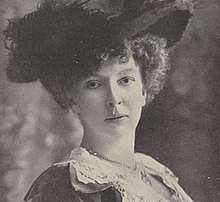
Cécile Chaminade (1857-1944) was a French composer. She received her early schooling on piano from her mother. Her next piano teacher recommended that she attend the Paris Conservatory. Her father did not allow this because it was considered improper for a girl of Chaminade’s class. He did allow her to study privately with teachers from the Conservatory. She experimented with composition as a young child, writing pieces for her cats, dogs and dolls. In 1878 she gave a salon performance under the auspices of her teacher, consisting entirely of her own compositions.

In the late 19th and early 20th centuries she gave recitals of her music throughout France, Switzerland, Belgium, Holland and England. She composed over 400 works and was successful at having her music published. In 1908 she gave performances in 12 cities in the United States, where her music was received with great enthusiasm. French composer Amboise Thomas said, of Chaminade, “this is not a woman who composes, but a composer who is a woman.”
Chaminade was honored by Academie Francaise, honored by England’s Queen Victoria with the Jubilee Medal and by the Athens Conservatory with the Laurel Wreath. In 1913 she was elected a Chevalier of the National Order of the Legion of Honour, a first for a female composer. Chaminade associated herself with nationalist composers such as Camille Saint-Saëns and Charles Gounod. Her style was rooted in the Romantic and French traditions. In describing her own style, Chaminade said “I am essentially of the Romantic school, as all my work shows.”
Amy Marcy Cheney Beach
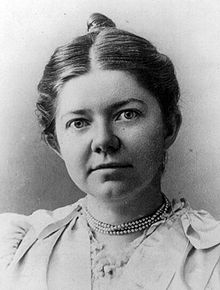
Amy Marcy Cheney Beach (1867-1944) was from New England. She was a child prodigy, singing accurately by age one, harmonizing by age two and composing by age four. She began piano lessons at age six and was soon giving public recitals of music by Handel, Beethoven and Chopin. Beginning at age fourteen, she studied composition and collected and read every book she could find on theory, composition and orchestration. At age sixteen she made a formal concert debut in local Boston concert halls; she performed with the Boston Symphony at age eighteen and the audience was “enthusiastic in the extreme.”

In 1885 she married Dr. Henry Beach, a respected Boston surgeon and Harvard lecturer. He asked that she stay home, not travel to perform and not teach piano lessons. She agreed and limited her musical activities to composition. With her husband’s blessing, she gave two public recitals each year, with the proceeds being donated to charity. During these years, she had several successes with her compositions, including a Mass in Eb Major, which was performed by the Handel and Haydn Society, and her Gaelic Symphony, premiered by the Boston Symphony in 1896. This was the first symphony composed and published by an American woman. It met with great critical reception. In 1900 the Boston Symphony premiered her Piano Concerto, with the composer as the soloist.
Upon Dr. Beach’s death, in 1910, Amy Beach traveled to Europe, where she rested for a while, beginning to perform again in 1912. She toured and performed throughout Germany until 1914, when the First World War began. At this time, she returned to the United States. Her music was featured at the Panama-Pacific International Exposition, in San Francisco, in 1915, and her Panama Hymn was commissioned for this event.
She spent her remaining years living first in New Hampshire and then in New York City, where she used her status as a well-known composer to further the careers of young musicians. She served as President of the Board of Councilors of the New England Conservatory of Music, and she gave performances and lectures at the University of New Hampshire, which awarded her an honorary Master’s degree in 1928. Throughout her career, she composed and published over 300 works in many genres, including piano, vocal, chamber and orchestral.
Florence Price
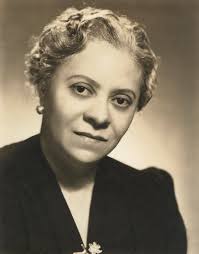
Florence Price (née Smith) (1887-1953) was born in Little Rock, Arkansas to a mixed-race couple. Her father, who was black, was a dentist and her mother, who was white, was a music teacher. Her mother guided her early musical training. The racial situation in Little Rock in her early years was calm and tolerant and the family was well respected in the community. Florence attended school at a Catholic convent and graduated as class valedictorian at age fourteen. After high school she enrolled at the New England Conservatory of Music, passing as Mexican, to avoid discrimination that would have prevented her attendance there, if she said she was from a black family.

At the Conservatory she studied composition and counterpoint and wrote her first String Trio and Symphony. She graduated in 1906 with honors, and with an artist diploma in organ and a teaching certificate.
Florence moved to Atlanta, Georgia to take the position of Head of the Music Department of what is now Clark Atlanta University, a historically Black college. She married Thomas Price, a lawyer, and the couple moved back to Arkansas, where he had his law practice. The couple had two daughters. The racial climate of Arkansas had changed considerably since Florence had moved to New England and she now found that she could not get work in music education or performance. In 1927 the family relocated to Chicago, to escape the racism that now consumed the community.
In Chicago Florence joined the thriving community of black artists who were influential in all aspects of music in the early 20th century. She and her husband divorced in 1931 and Price became a single mother to her two daughters. To make ends meet, she played organ for silent film screenings and composed songs for radio ads under a pen name. She started to make inroads to the local classical community with her orchestral works. She submitted compositions to the Wannamaker Foundation competition and won first prize for her Symphony in E Minor, and third prize for her Piano Sonata. In 1933, the Symphony in E Minor was included in a program presented by the Chicago Symphony Orchestra at the Century of Progress World’s Fair. This was the first time that music by a black or African-American woman was performed by a major U.S. orchestra. Later, the Illinois Host House of the World’s Fair devoted an entire program to Price and her music.
In 1940, Florence was inducted into the American Society of Composers, Authors and Publishers for her work as a composer. Florence continued to have moderate success with her orchestral, chamber and choral compositions, but never received the acclaim she was due. She died of a stroke in Chicago in 1953 at age 66.
In 2009, a substantial collection of her works and papers were discovered in an abandoned house that Price had used as a summer home. These manuscripts have created new interest in her works, with the result that she is finally getting the recognition she deserved but never received during her life. The Philadelphia Orchestra’s recording of her Symphony in E Minor won a Grammy Award in 2022 and, in 2025, Singers Michelle Cann and Karen Slack received a Grammy Award for “Best Classical Solo Vocal Album” for a recording of Price’s previously unpublished songs, many of which were rescued from the abandoned summer home.
Lynn Ahrens

Lynn Ahrens (b. 1948) was born in New York City and grew up in Neptune Township, New Jersey. She graduated from Syracuse University with a degree in Journalism and English. While working as a copywriter for McCaffrey and McCall, she would bring her guitar into work and write songs on her lunch break. One day producer George Newall was passing by and heard her playing. He asked her to write a song for the children’s television program “Schoolhouse Rock.” She wrote “The Preamble” and sang it for use in the television show. She was soon regularly writing songs for the show and for other children’s programs, including “Captain Kangaroo.”

Lynn began writing for musical theatre in 1982. She met composer Steve Flaherty and the two began working together, writing music for many Broadway shows including “Once on This Island,” “My Favorite Year,” “Seussical,” “Rocky the Musical” and “A Man of No Importance.” Their music for the stage show “Ragtime” was nominated for twelve Tony awards and won Best Original Score. The pair was nominated for two Academy Awards and two Golden Globes awards for the animated film “Anastasia” in 1997. They adapted music from the film for the stage version in 2016. Flaherty and Ahrens serve on the Council of the Dramatists Guild of America and founded the DGF Fellows Program for Emerging Writers. In 2014 they received the Oscar Hammerstein Award for Lifetime Achievement and in 2015 they were inducted into the Theater Hall of Fame.
Elena Roussanova Lucas
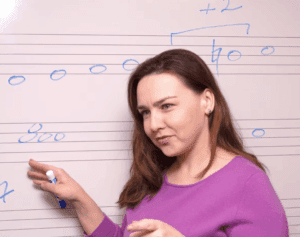
Elena Roussanova Lucas was born in Moscow, Russia in 1974. She began studying music at age three, when her family noticed her exceptional talent and interest in music. She graduated from the Tchaikovsky Moscow State Conservatory with highest distinction, in composition. Her professional career includes a long list of accomplishments in composition, her foremost passion, as well as teaching and performance. Her works have been performed and recorded by the Buffalo Philharmonic Orchestra, the Tchaikovsky State Orchestra of Moscow, the Prague Radio Symphony Orchestra, the Dallas Brass and many other top-level groups. She was awarded The American Prize in Composition for Orchestra Music in 2017/2018.
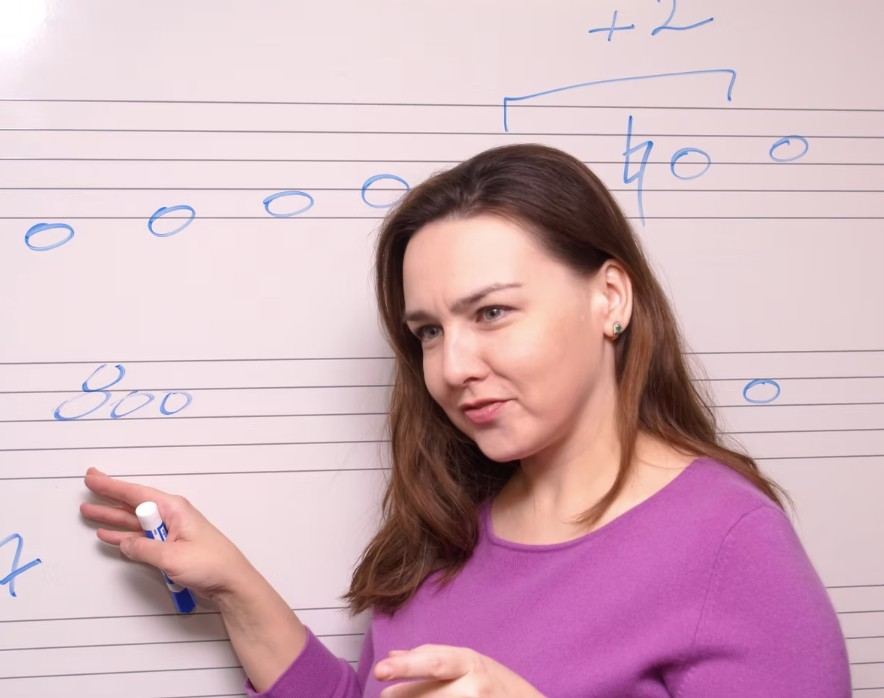
Currently, Elena holds the position as Professor in Composition at the Berklee College of Music. Previously she served on the faculties of Boston University, New England Conservatory and as Co-Artistic Director of Berklee International Composers Institute (2008-2015) Boston, U.S.A.
This evening the Cary Town Band performs excerpts from her “Tatarian Dances,” a work that she dedicates to her mother, Lidia Roussanova.
Yukiko Nishimura
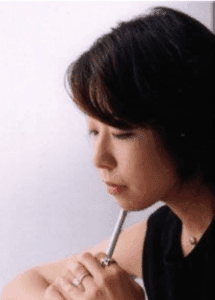
Yukiko Nishimura was born in Kyoto, Japan in 1967. She began studying music on her own initiative at an early age. She started piano lessons at the age of four and began learning composition at eight. She graduated from the Tokyo National University of Fine Arts and Music in 1990. She continued her studies in composition at the University of Florida and with eminent composer Alfred Reed at the Manhattan School of Music. She has won numerous awards for her compositions and has received many commissions for works for piano, marimba, chamber groups, string instruments, percussion, bands and orchestras. Since 1996 she has given concerts of her own piano music throughout Japan. The hallmarks of her music are that her compositions are heart-warming, with musical depth and sensitivity.
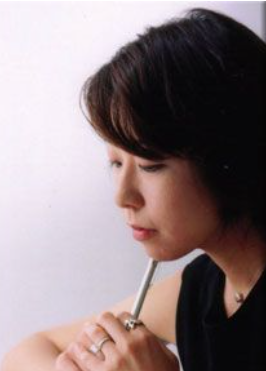
Erika Svanoe

Erika Svanoe (b. 1976) is a conductor and composer for wind band, known for her lyrical melodies, nods to classic literature, musical deconstruction, humor, and pastiche. Her works have been performed by “The President’s Own” United States Marine Band, the United States Navy Band, the National Concert Band of America, featured at the Midwest Clinic, the American Bandmasters Association National Conference, and the Boston New Music Festival, and on Wisconsin Public Radio, in Bandworld’s Top 100, and the Teaching Music Through Performance in Band series.
She earned a Doctor of Musical Arts in Conducting from The Ohio State University under Russel C. Mikkelson, where she served as conductor of the OSU Collegiate Winds, assistant conductor of the OSU Wind Symphony, and taught undergraduate conducting classes.
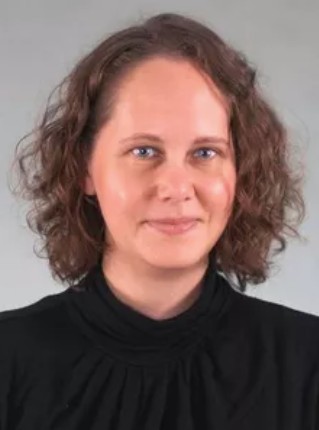
Her DMA dissertation included a critical edition of Aaron Copland’s El Salón México for wind ensemble. She holds a Master of Music in Wind Conducting from Oklahoma State University and a Bachelor of Music Education from the University of Wisconsin–Eau Claire.
Her first major work, The Haunted Carousel, won the 2014 NBA Young Band Composition Contest. Her first album, “The Music of Erika Svanoe,” was recorded by Andrew Boysen, Jr. and the University of New Hampshire Wind Symphony, and released in 2022.
As a conductor, Dr. Svanoe has held residencies with the Manhattan School of Music, USAF Heritage of America Band, the Atlanta Freedom Bands, and numerous universities. She has held collegiate appointments at Augsburg University, Bemidji State University, and the University of New Hampshire. She is active as a guest conductor and clinician, appearing with high school, university, All-State and festival ensembles across the United States.
Julie Giroux
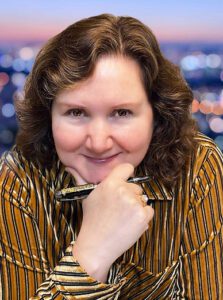
Julie Giroux (b. 1961) was born in Massachusetts. She started playing piano at three years of age and began composing at eight. Her first published work, published by Southern Music Company, was composed at the age of thirteen. Julie graduated from Louisiana State University, Baton Rouge, LA in 1984, and began composing commercially in that same year. She has over 100 credits for films, television and video games. She has been nominated for multiple Oscars, Grammys, Emmys and Golden Globe Awards. She has won three Emmy awards. Julie is a recipient of the Distinguished Service to Music Award and was the first female conductor inducted into the American Bandmasters Association, in 2009.
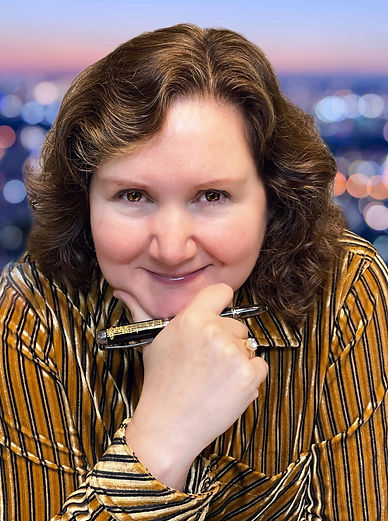
Giroux has published a large catalog of classical works with emphasis on original compositions for Wind Band which are published by Musica Propria and distributed internationally. She is greatly sought after as a composer and recently completed her 5th Symphony “Sun, Rain & Wind” which premiered in June, 2018. Her music has been recorded and reviewed internationally, receiving top reviews and her music has been performed at major music festivals the world over.
Her work “No Finer Calling” was written in celebration of the 60th anniversary of the U.S. Air Force. The first movement “Integrity March” is a fanfare and processional. In 2021, when Kamala Harris was inaugurated as the first female Vice-President of the United States, this work was performed by the U.S. Marine Corps Band as Harris was introduced. This marked the first time that music by a female composer was ever used during a U.S. Presidential Inauguration Ceremony.
Julie Giroux currently lives in Madison, Mississippi and continues to compose, orchestrate and arrange for television, movies, video games, wind bands and orchestras. Many of her compositions for wind bands in particular have been recorded by the distinguished University wind ensembles at the University of North Texas and the University of Texas at El Paso.
Taylor Swift

Taylor Swift (b. 1989) was born in West Reading, Pennsylvania. She was named for singer/songwriter James Taylor. At the age of 11, her parents took her to Nashville, Tennessee, where she visited the offices of the major music studios, giving them her demo tapes and assuring them that someday she would be a star. At this time, she was singing “covers” of Dolly Parton and the Dixie Chicks. The studios told her that she had a nice voice but that she had to create original music, if she wanted anyone to notice her. She went home, learned to play guitar and started writing her own songs. Her songs are often autobiographical, offering emotional engagement to her listeners. She has explored country, pop, folk, rock and alternative music.

Her publication and performing accomplishments have been legendary – she has produced seven albums that sold a million copies in the first week, she is the highest-grossing tourist artist and the richest female musician in the world. She has won fourteen Grammy awards and four Grammy Album of the Year awards. She was named “Person of the Year” by Time magazine in 2023. She has performed on many successful tours; her Eras Tour (2023-2024) is the highest-grossing tour of all time and earned over $2 billion in revenue.
Virginia A. Allen
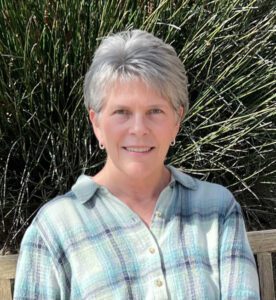
Virginia A. Allen is a retired faculty member of The Juilliard School, where she served as the Associate Dean for Administration, the Assistant Dean for Orchestral Studies, and the founding Artistic Director of the Conducting Workshop for Music Educators. At Juilliard, she taught conducting and studio pedagogy. Additionally, Virginia taught conducting at The Curtis Institute of Music and University of the Arts in Philadelphia and at Teachers College, Columbia University in New York City.
Prior to teaching on the college level, Virginia enjoyed a 20-year career as a conductor and administrator in the U.S. Army Bands Program and achieved the rank of lieutenant colonel.
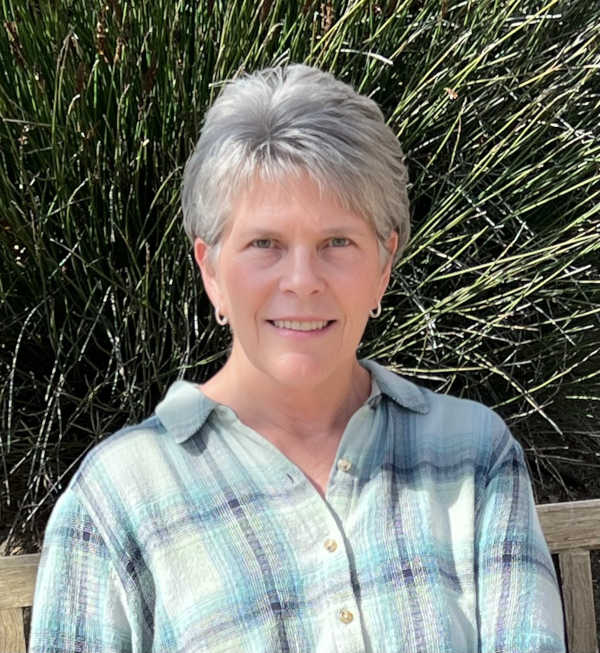
As a pioneer for women in military bands she was the first woman to command and conduct an active-duty military band that integrated women and men when she was appointed Commander of the U.S. Army Forces Command Band in Atlanta. As Associate Conductor of The West Point Band, she was the first woman conductor of that historic organization, as well as the Cadet Glee Club and Cadet Band. She also performed on stages from the Hollywood Bowl to Europe as the first woman conductor of The U.S. Army Field Band and The Soldiers’ Chorus, the Army’s premier touring ensembles from Washington, D.C. Her military career included an assignment as the Department of the Army Staff Bands Officer in Washington, D.C., where she managed over 100 Army bands and band activities worldwide.
As an arranger, Virginia’s music has been premiered, performed, and recorded by members of the Chicago Symphony, the Philadelphia Orchestra, the San Francisco Symphony, the Washington Opera Orchestra, the Dallas Symphony, the Buffalo Philharmonic, the Brazilian Symphony Orchestra, The Juilliard Trombone Choir, The U.S. Army Band, The U.S. Army Field Band, and The West Point Band.